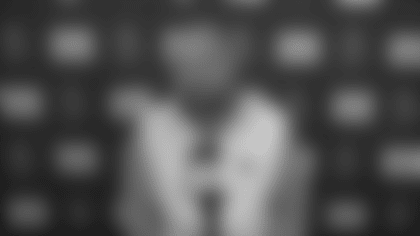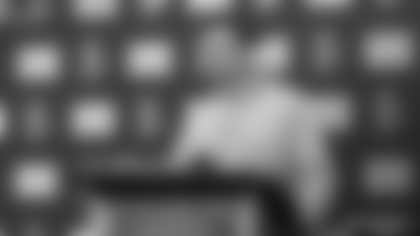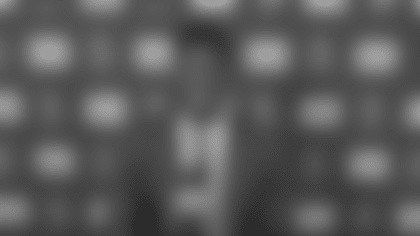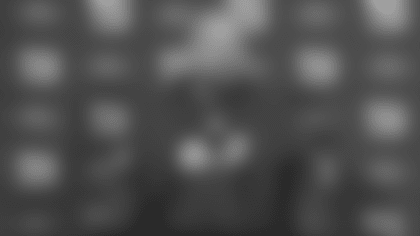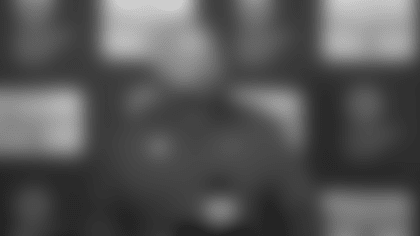Assistant Head Coach/Defensive Coordinator Patrick Graham
Q: Can you take us back to your decision to come here? Obviously, (Dolphins Head Coach Brian) Flores said this week that your wives are very close, so I'm assuming you two are very close. To leave one good friend to go work for another friend, what was that decision like?
A: I think Flo said it in the media this week – we're like brothers and just respected my decision and allowed me to come. It was just a chance to come back here to the New York Giants, close to home, close to my family, so that's really most of what played into it, to be honest with you.
Q: You're better friends with (Head Coach) Joe (Judge) then, obviously?
A: I spent a lot of time with Flo in the office. Flo, we're very, very close. Very, very close. I'm not going to differentiate. That's not funny to me. Flo is my man. I learned so much from Brian Flores. He's one of the smartest human beings I've ever been around in football, non-football. He challenges you to get better every day. I wouldn't be in this position if it wasn't for Flo. Learned a ton about football, learned a ton about life. There's nobody, in my opinion – I mean, he's one of the best coaches in this league in terms of whether it's leadership, in terms of strategy. I know these other people get mentioned all the time, but the guy was defensive coordinator when they won the Super Bowl, holding that team to that many points. The leadership he has displayed down there in Miami, the leadership he has displayed whether we were QCs, whether we were position coaches. I'm just telling you, that is my man. I love him to death and I would not be here if it weren't for him in terms of how he challenges you to get better every day. He does a great job of that.
Q: What did you learn about being a defensive coordinator? That was your first year being a defensive coordinator. I know you weren't necessarily calling all the plays or whatever, but what did you learn that year just about being a defensive coordinator?
A: The thing about Flo, Flo is going to make sure he drives you to be the best version of yourself and he was like that when we were just position coaches or when he was a QC. In terms of just making sure you're thinking through all of the matchups, making sure you're thinking through all the strategy, the detail and then on top of that, he's smart, he's tough on the players, he's tough on the coaches. He's just a good coach and a good friend. In terms of learning to be a defensive coordinator, he had done it a year before that and he did it at such a high level, at the highest level winning the Super Bowl, so I really just listened to him and just learned a lot from him.
Q: Did he make a mistake by letting you leave?
A: Did he make a mistake by letting me leave? We don't look in the past. We don't look in the past.
Q: How would you describe your aggressiveness compared to his?
A: My aggressiveness?
Q: We see the way they're blitzing like crazy.
A: I think that each game plan, each person is different. There's no question there. Each game plan is different. I'm sure if you looked at some other game plans where we might have been aggressive, they might not have been – I mean, I don't know. The characteristics of a coordinator vary from person to person. I can't compare. For the most part, I'm watching the offense, so I can't tell you. I know they do a good job with pressure and stuff like that, but it's just based on the game plan.
Q: What do you say to the idea that he's more aggressive than you?
A: More aggressive? That's fine. That's fine.
Q: Just philosophically?
A: Philosophically? The main thing I focus on philosophically is playing with good football position, putting the team first and diving into the process, the same three things I talk about all the time. That's what philosophically gets to it. By week, just try to do what's best for the team and try to put the players in the best position and try to win the game. If it means play two-high and give up 100-something yards rushing and we win the game, I'm good. That's me, that's me.
Q: Is that the performance against the Eagles defensively what you had envisioned?
A: Two hundred yards rushing? No. The win? Yes. That's what we were looking for, the win. We knew what we were trying to do. How is it applicable this week? Two different teams, two different teams. The Miami Dolphins are on an uptick right now, (Dolphins Quarterback) Tua (Tagovailoa) is playing really well, they're running the ball and got over 100 yards the last two games, the offensive line are young guys and some different pieces in there that are starting to click, so hopefully there will be some carryover from the game. That's always easier for the players, like, 'Hey, we used this and this scheme last week. Let's bring this over to the game now.' Will it all be applicable? No, but again, it's really about this week right now and they present a lot of challenges, whether it's the quarterback playing at an alarmingly great rate in terms of efficiency, (Dolphins Running Back Myles) Gaskin, they've got (Dolphins Running Back Phillip) Lindsay now, they're running the ball pretty good, all the gadget stuff they do in terms of the Wildcat, the reverses, the jet sweeps there to the guys, so it's a challenge. It's a challenge.
Q: (Cornerback James) Bradberry has said himself that he wasn't playing up to his standard. Was that game against Philly the kind of game you were looking there from him?
A: I think what Brad did in terms of limiting the effectiveness of the receivers he was matched up on – and at some point we went to having him on (Eagles Wide Receiver DeVonta) Smith and he did a good job. The thing about Brad is he's so long. So long, so that at the line of scrimmage when he's there and being square and getting hands on people, it's hard to get around him. They might be open later in the down, something like that, but when a quarterback sees that it's hard, it's hard to stay with it because you see the guy blanketed in the beginning, so I think Brad is just continuing to improve. Again, he's a relatively young player, he's working through it. I was happy with what he did last week and we've got a big challenge this week, whether it's (Dolphins Wide Receiver Jaylen) Waddle, the guys out there – (Dolphins Wide Receiver DeVante) Parker practiced yesterday. We're going to have a challenge for us and plus the quarterback is throwing the ball efficiently.
Q: Do you have to approach a game any differently when it's 81 degrees and you're coming from a game where you played in football weather?
A: Oh, absolutely. Absolutely. I think having lived down there and having coached down there, it's definitely something you've got to pay attention to. Again, we're not playing the weather, so it's about how we play the game and how we execute. But, you've got to make sure you're staying hydrated, make sure guys understand that it's going to be a little bit of a weather change. When you get to the hotel, make sure you go outside and don't let the first time you get outside be the morning of. Just get a little used to it, but definitely take it into account.
Q: Do you rotate more?
A: Do you rotate more? We rotate a good bit already. I could see why you would.
Q: When you watch Waddle on tape, what is it that is making him so successful this early?
A: He's fast. That's the first thing, he's really, really fast. He's explosive out of his breaks and then I would say (Dolphins Co-Offensive Coordinator/Tight Ends Coach) George (Godsey) and (Dolphins Co-Offensive Coordinator/Running Backs Coach) Eric Studesville are doing a good job of putting him in spots to get him open. Again, I know those two guys, I QC'd with George, so in terms of familiarity, whether it's George, (Dolphins Defensive Coordinator) Josh (Boyer) over there on the defensive side of the ball, (Dolphins Outside Linebackers Coach) Robby Leonard, who was here, Flo, all these guys, I know all these guys. They're really smart coaches and they're doing a good job of getting him in space, creating mismatches with the guys, so that's one thing they're doing. On top of his skill level, they're putting him in the right spot and that's what I'm seeing on tape.
Q: What makes this group of yours so good at creating turnovers? You have one in every game this year.
A: I think we have some ball hawks. I think (Safety) Zay (Xavier McKinney) – again, I didn't know him when he was in college, but some of our coaches knew him in college and when he was in high school – he's always been a ball hawk. He's always been somebody who can get the ball. You talk about (Cornerback) Darnay's (Holmes) interception last week – I mean, Darnay was basically a skill player back at UCLA, whether he was returning kicks, getting interceptions when he was playing outside playing corner, so I think that's part of the evaluation process when we're going through the draft. We're looking for guys who are ball hawks because some of it can be taught, but some of it is just natural with those guys that want to get to the ball. The more of those guys that we can have and the better we can execute in terms of practicing the techniques, giving them some tendencies to be able to play fast with anticipation, it all comes into play and they're doing a good job. I think they take pride in it. They take pride in it. We always talk about taking the ball away from them, whether it's a turnover, a takeaway, but you're taking the ball away from them. That's something they take pride in.
Q: I think I heard you say before that one of your overall defensive philosophies is to take away the game breakers, which is obviously easier said than done or some of the best players wouldn't have great stats ever. I looked back just last game as an example, (Eagles Tight End Dallas) Goedert and Smith didn't have huge games. Can you just talk about that process of taking away the best player and kind of letting other guys beat you?
A: That's how I learned football, in terms of who are the guys that can win the game, who are they trying to win the game with. If we can take those guys away, then it forces them to play left-handed. Not saying the other guys can't make plays – I remember in 2014 against Green Bay when we went up there in December, we were taking away (Packers Wide Receiver Randall) Cobb and (Jordy) Nelson, and (Packers Wide Receiver Davante) Adams to that point didn't do anything. Didn't do anything. That game he did something (laughs). That game he did something and we lost. I remember when I was at Green Bay, I told him about that and I explained to him the whole story, I said, 'Man, you stepped up and you won the game for them.' But, that's the process, you try to make them play left-handed, but you've got to be ready for their other options. Sometimes it works out, sometimes it doesn't, but the key thing is just thinking about Miami, they've got guys that could really hurt you. You know who they're trying to get the ball to. You try to take them away and see if the other guys can beat you. But when you've got a bunch of skill guys, you've got (Dolphins Wide Receiver) Albert (Wilson), you've got Gaskin, who's playing well, you've got Tua playing well. You can try to take away the other guys, but then you've got to make sure you're defending them.
Q: Triple-team Waddle, right?
A: (Laughs). Triple-team? I don't know. You're going to have a hard time with (Dolphins Tight End) Mike Gesicki over there and Gaskin. It would be tough.
Q: How much work had (Cornerback) Aaron Robinson gotten outside? Seemed like he got pressed into that during the game. How do you think he did? It seems now he's going to have a potentially bigger role with Darnay out.
A: I think, again, our job as coaches is we've got to be able to anticipate some of the sudden change. It's something that Flo used to say all the time, 'Adapt or die,' so in terms of being able to adjust to that, we've got to make sure during practice that we're getting them work both ways. Especially at the DB position, you see how we roll those guys. Somebody like (Safety Julian) Love, he's playing P, P and punt. He's a safety one minute, he's a nickel back one minute, he's a sub linebacker. We've got to anticipate the possibility of that and so what we do is we cross-train everybody. We cross-train everybody. Now, are most of his reps more inside? Probably if you looked into it and tracked it, but we try to cross-train the guys because they understand that your place on the team is determined by your value. Obviously, you have more value if you can do more stuff and they buy into it. That's something that Joe preaches. That's how we learned the game of football. Again, I keep saying 'we' because all the guys we're talking about, these coaches, whether it's George, whether it's Josh, whether it's Flo, whether it's me, Joe, we all worked together and we were all young guys in the cafeteria trying to get our food and go back to our desks and not sitting down, and having conversations in our meeting rooms. That's really where it comes from.
Special Teams Coordinator Thomas McGaughey
Q: There's been at least three games where at the very end of the game, (Punter) Riley Dixon has hurt you guys whether the punt is short, shanked, out of bounds or in the endzone. What's going on at the end? Why does he have trouble at the end of the game? Is it the idea of them coming for a block?
A: Well, obviously, in situations where it's a you've-got-to-have-it situation, you're trying to get the ball out as quick as you can and when that happens, sometimes, technically there are some things that go wrong. He's had some issues there and we're working to clean it up. He'll be fine. That's just part of it sometimes. You've got to execute, you want to be able to execute at a high level at that point. Sometimes you don't come through and he's working at it and he'll get better as we move on.
Q: Can you describe the sequence there because you guys lined up and had two gunners out wide and you wait, call time out and then run everybody in. Can you just take us through that?
A: Just a strategic thing. It's like offense or defense. If you get a chance to see what they're going to do, see what they're going to do. Strategically, we wanted to make sure that we had maximum protection at that time to make sure we got the punt off and that was it. Just trying to, just a strategy thing. Just trying to see what kind of rush we were going to get.
Q: Any thoughts on taking a safety in that spot?
A: Yeah, that was discussed. Those situations and scenarios, we talk about them all the time leading up to the game. That was an option at that point.
Q: Do you know who your safety guy is? Are you going to have Riley run back there or do you put in a wide receiver?
A: No, no, it would be our punter.
Q: (Dolphins Assistant Head Coach/Special Teams Coordinator) Danny Crossman is a little wild, isn't he?
A: No, Danny's a good man. I've known Danny. Danny's a hell of a football coach. He's been doing this thing almost 20 years now. He was a heck of a player when he played. He actually played for one of the guys that coached me, Frank Gansz Jr., at Pitt (University of Pittsburgh), so I've known him, been around for a long time. He's a great coach. His teams over the years when you look at them, they've always been, they play hard, they play like how he played. Just tough, they're always disciplined and schematically, they do some really good stuff. They are aggressive in their approach and they have been. The last couple of years, they have been, not so much this year, but when they get a chance to make a play, make a game changing play, they're going to try to make it, that's for sure.
Senior Offensive Assistant Freddie Kitchens
Q: How'd you feel like the operation went the other day?
A: I thought the operation was smooth. It's our job as coaches to make it smooth and it's the players' jobs to coordinate it smoothly once the call gets into the huddle.
Q: How different is what you're doing now compared to what you did when you had a title as offensive coordinator in Cleveland?
A: I don't think this situation is uniquely different than any other situation. It's always a staff-oriented approach to game planning to what you want to call in certain situations and things like that. I'd say it's not unlike any other situation with any staff, even before.
Q: It sounds like you reached out to the players on what they like to do and what they think can help. Why was that important to do at this point?
A: Well, I think as coaches we always try to do that. You need to get a sense and feel for what they're comfortable with. To me, why would you call something, and this is the way our staff believes, why would you call something if a player's not comfortable running it? It's your job to get them comfortable running it. If you think it's a good scheme or a good play or whatever the case may be, it's your job to get them comfortable doing it. But if you can't get them to that point, it's kind of diminishing returns.
Q: How many of the player suggestions would you say you incorporated into your game plan?
A: I think this is a never-ending process. It's constant communication. That's what we try to stress is it's communication between coach and coach, coach and player, player to coach. It's always constant communication, so I wouldn't put a number on it. So I think it's always a continual process.
Q: Speaking of comfort, (Quarterback) Daniel (Jones) had never worn a wristband before, so what was the conversation like with him about doing that? How comfortable do you think he was with that?
A: I think he saw the benefits of it. Everywhere I've always been, I think they do it around the league a lot, you see quarterbacks with wristbands. It helps the communication process, but it's just like any other thing, you've got to practice that as well.
Q: Who do you expect to have at quarterback this week?
A: I expect Daniel to come out today and practice and I fully expect to it be just like regular old times.
Q: How different is a game plan with Daniel, obviously you do a lot of read options, than with (Quarterback) Mike Glennon?
A: Well, I think as a coach and as a staff, we always try to put our players in the best situation to be successful. They have different skillsets, but that's neither to say one's bad or one's good from the standpoint of what you're going to call. It's just our plan is going to be our plan and we're fully expecting to have everybody.
Q: Does your play calling change with Daniel if he is playing with some pain in his neck there?
A: I don't see anything changing. We're going to prepare like we prepare every week and whoever's there on Sunday, that's who we're playing with. But we're going to get everybody on our – we've got 53 guys on the roster. I think we're up to 53 now, we may have 52. I don't know the exact – don't quote me on that. Whoever's at the game is going to be ready to play and that goes from player number one to player number 46 or 47, however many we have active.
Q: With the wristband, does that basically help Daniel get the play quicker? Do give him a number or something and then he looks at it on the wristband?
A: Well, it all has to do with smoothing out the communication process.
Q: So the goal is to give him more time to essentially look at the defense?
A: I'm not telling you what wristband number eight is.
Q: I wouldn't understand it anyways.
A: Well, you would if you had a wristband (laughs).
Q: The goal is to kind of get him more time to look at the defense, is that fair to say? And see what they're doing without being as rushed.
A: The goal of a play caller and as a staff and all that is to get the play to the quarterback as quick as possible. Not necessarily for him to dissect the play in his head, but for him to – you want to break the huddle as fast as possible to get to the line of scrimmage and have more time to see and react.
Q: Are you giving him any more freedom than he had had previously at the line to change a play?
A: I think it's always been our thought as a staff for a long time that the quarterback has to drive this thing, all right? The quarterback has to drive decisions. In saying that, everybody should know, if they're prepared, which we try to get our guys prepared every week, they should know what's coming. They should know the answers to the test before the test gets there.
Q: When you have a change in play callers mid-season, is there a limit to what you can do or can this offense over time start to look a lot different than it did in the past?
A: I'm not really sure how to answer that. I'm not going to get myself in trouble by saying something about that. The game plan is going to be the game plan.
Q: I assume you have ideas of things you want to do differently. I assume you also are working out of the same play book. Can there be –
A: The terminology stayed the same. Everything, our approach, from the standpoint of how we call things, stayed the same. It's all about familiarity with the players and what they're used to at this point. So the ultimate goal is to play fast when the ball is snapped. As much of that consternation that you can eliminate early before the ball is snapped, of course that benefits you to enable you to put your mind and focus on the task at hand, which is that individual play, whatever that play may be.
Q: When former players who are now media guys look at the Giants offense –
A: Oh Lord (laughs).
Q: I'm saying not just us, guys who play the game say that whoever the Giants' offensive coordinator is, is hamstrung because the offensive line is struggling so much. I'm curious, are you calling plays because the offensive line is struggling with that in mind? Or do you not agree with that assessment?
A: I think we try to put our players, each individual player – whether they're up front, tight ends, wide receivers, running backs or quarterback – we try to put them in the best possible position to be successful. Everybody has role in this, so we try to put everybody in a position to be successful.
Q: Last week, (Head Coach) Joe (Judge) said the game plan would be a collaborative effort. Is that always the case or is it you're having more of a say in what's in?
A: Every staff that I've always been on it has always been a collaborative effort, and if it's not, something's wrong in that area. We need input from (Quarterbacks Coach) Jerry (Schuplinski). We need input from (Wide Receivers Coach) Tyke (Tolbert). We need input from (Offensive Line Coach) Rob (Sale). We need input from (Running Backs Coach) Burton (Burns). We need input from (Offensive Quality Control Coach) Russ Callaway, (Offensive Quality Control Coach) Nick Williams, (Offensive Assistant) Jody Wright. We need input from everybody. I think we do a good job of communicating, working through things. What do we want to do here? Who are we trying to attack? What personnel do we want to use? Everybody has different suggestions and that's how we roll, but that's not unique to any other situation I think you find across the league. Of course, I think you have some staffs that are better at it than others, but I don't think that's anything unique.
Running Back Saquon Barkley
Q: How are you feeling coming out of the game and this week so far?
A: Like I said after the game, this is one of those things where week by week it's just going to keep getting better and better. Just getting back in a rhythm, just feeling it, getting my eyes back into it last week. I felt like I played better last week than I did in Tampa. Felt like my legs were underneath me a little bit better. Throughout the rest of the season, just going to continue to get better.
Q: The Dolphins zero blitz a lot. How does that affect the run game?
A: They're a top-ten run defense in the last seven weeks. The last seven or five weeks, they've been number one, averaging only like 80 yards a game, so it's going to be a tough matchup. But you watch it, there are opportunities out there for plays to be had just like every week. We've got to go capitalize. We know that we're going up against a great defense and a team that's on a hot streak, but we've got to go out there and give our best and hopefully come out with a dub.
Q: Did you notice any change in the play-calling with (Senior Offensive Assistant) Freddie (Kitchens) as opposed to Jason (Garrett)?
A: Like I said after the game, you really only could change so much Week 12, Week 13 of the season. Obviously, we had a little bit of different wrinkles as you guy can see in the game. But as the season goes on and all the offensive guys get together, probably a little more wrinkles are going to come in. We've just got to come out in practice, run the plays, execute the plays in practice and then when they're called in the game, make it work.
Q: Do you think it's more advantageous to target (Wide Receiver) Kenny Golladay seven times instead of two?
A: I feel like a lot of people get caught up with the targets or catches, receptions, carries. At the end of the day, it's football. Obviously, everybody as a competitor, you want to be the one with the ball in your hands to make a play to make your team win, but however you've got to get the job done to get a win, that's what it's got to be. There might be a game where I carry the ball 25 times or KG might have 11 catches or (Wide Receiver Darius Slayton) Slay might have 11 catches, (Tight End) Evan (Engram) have 11 catches and we win. There might be some games like last week where we're not finishing on offense, but the defense is playing lights out and the special teams is playing lights out and we still get the win. I think people outside get so caught up in how many times this person is getting the ball or how many times this person is touching the ball, when the only thing and our whole main objective as a team is just finding a way to get the dub. Whatever it takes, that's the way we've got to do it.
Q: How much do you enjoy being used in the passing game?
A: I like it a lot. That's something I train. Obviously, this offseason was more focusing on just rehabbing and getting my body right and getting my knee right, but in previous years I put a lot of work in route running and catching. It kind of started in college when I was challenged by my running backs coach to try and become more versatile. I like doing it. I've got to continue to grow, continue to get better at it, see coverages better. The more I do it, it's an opportunity for me to be able to make a play for my team, so I enjoy it.
Q: How much would it hurt if you didn't have (Quarterback) Daniel (Jones) on Sunday?
A: Daniel's an amazing guy. He's a hard worker, he's a leader. Obviously, when he's not on the field, you're missing something. He's special. He's a heck of a player, but at the same time we have to have the next man up mentality. Whatever happens, however it plays out when we get to Sunday, we've all got to be ready to go out there and try to get a win. But like I said, he's a leader, he's a captain and he's a heck of a player. Not having 8 out there is obviously going to be something that's a little bit different because of how special a player he is and how much he means to our team.
Q: Why do you think you guys have had so many injuries this season?
A: That's a great question. It's kind of just bad luck, to be completely honest. We work hard. I don't think we're overworked. We have a great, great training staff. We have a great strength staff and it's not like that everywhere, so we're very fortunate, we're very blessed in that avenue. We have a lot of players here who put their head down and they work hard. A lot of the injuries are just unfortunate. You see some stuff where they're just freak accidents. I had one this year for example. There's been a couple out there, but that's part of the game. I think we've been doing a great job, especially guys who get opportunities to step up and make plays, whether it's in a two-minute drive against the Eagles, if it's (Fullback) Eli Penny having to play a little more running back. All those guys on our team always have that next man up mentality and they're going out there and they're working their butts off and working their tails off.
Wide Receiver Kenny Golladay
Q: Still looking around for the flag on that pass to the end zone?
A: Which one?
Q: In the first quarter.
A: Oh, you're talking about in the game. I'm not even worried about that no more. I'm on to Miami.
Q: What was the difference? Did you notice any difference in the offense for you on Sunday?
A: I feel like as an offense we were going out there and competing. We did some things well, but we also left some stuff out there, kind of like what he just brought up with the fades and everything. Just got to get on the same page a little more, a little bit more work at it.
Q: How nice was it to get more than two targets?
A: I had three catches?
Q: I think you had seven targets.
A: Yeah, it's alright. I still only had three catches. I wish I would've brought a couple more of those down.
Q: In terms of everybody getting on the same page, is it just a matter of timing? You have a few more games to play still.
A: I guess if that's what you want to say. More so just with those fades, we didn't run a lot just going up against defenses. It's one thing doing it when a guy is in front of you and another thing doing it just on air. It's all about ball placement, me squeezing and holding the line a little bit better. A lot plays a part in it.
Q: When you're playing a team like Miami which brings pressure, does that change how you have to do things as a receiver?
A: At the end of the day, it's still about being open. That means if they're bringing pressure it's going to be man and you've just got to beat the guy that's in front of you.
Q: (Head Coach) Joe (Judge) talked about it, (Senior Offensive Assistant) Freddie (Kitchens) talked about it, getting input from players and making the offense more player-based. How refreshing and how welcomed is that for you, someone who clearly wanted to be more involved in the offense?
A: It's huge. You can come over to the sideline and actually, since you're the one out there running, you can actually tell them what you're seeing. It's one thing running it on the field and a coach standing on the sideline trying to get all the way on the other side of the field. Just going in there and giving them good information, and not giving them selfish information.
Q: And you got that feel during the game that there was more openness for that kind of input from you guys?
A: Yeah. I'm not saying there wasn't openness with (Jason) Garrett, but Freddie did want to hear from us a little bit more.
Q: You had a huge change last week at offensive coordinator. What if (Quarterback) Mike Glennon has to play quarterback this week?
A: Both guys are preparing. It's going, I guess, day by day right now, but if Mike is back there I've got to make plays regardless.
Q: Have you had much work with him?
A: We're taking reps here and there.
Q: Mike is 6'7". Is it easier as a receiver to see a ball coming out when the quarterback is tall? Does it change anything about the reception of it?
A: 6'5", 6'7", that's pretty much the same thing to be honest. I mean, that's still tall as hell (laughs). I'm 6'4" and I still look up to both those guys. I don't have a problem with seeing (Quarterback Daniel Jones) DJ at all and I for sure don't have a problem with seeing Mike. Tall is tall at the end of the day when you get past 6'4". Tall is tall.
Q: Were you encouraged by the fact that you had seven targets last game?
A: To be honest, I really didn't count. When you're actually seeing the ball a little bit more, you don't even start counting the targets, but you know if you get two targets, if that makes sense. I didn't even know how many targets I had, I knew how many catches I had. I know there were some opportunities out there that I wish I had back, like on those two fade balls. I don't want to leave it in the ref's hands. Just got to do better, but I feel like I made plays down the stretch when we needed it.
Q: Obviously, there are outside factors, injuries, who the coordinator is, but 372 yards with no touchdowns 11 games in…
A: Of course, that's not what I wanted coming into the season, but I still have games left. Just trying to continue to put good stuff on film.
Q: Did you exchange any words with (Eagles Cornerback Darius) Slay during the game?
A: No and I'm not the type to be trash talking back and forth. Like I said last week, that's my boy, so if anything, 'I hope everything's alright,' 'How's the family?' and 'Stay healthy.' That's it.
Q: What do you expect from these two cornerbacks that you're going to face? These are two highly-paid, pretty good cornerbacks.
A: I look at it at the end of the day as I still have to do my job. Those are two good players over there. At the end of the day, when the ball comes my way, I want to make the play.
Q: When it's zero blitz, do you have to expect the ball faster? Do you have to get separation faster? That's what they do all the time?
A: They do it quite a bit. Of course, you're going to need to speed up the route a little bit, but there are going to be checks to be made and everyone needs to be on the same page. That's kind of what it goes down. If everyone's on the same page, then you can gash the zero blitz.

Single Game Tickets
A limited number of Giants 2021 single game tickets are on sale now







